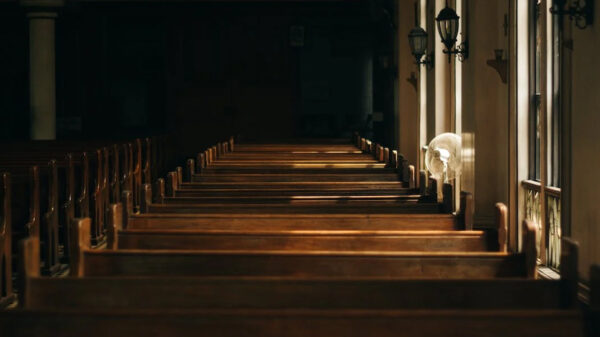
I discovered this first hand as I pitched a television series about Jesus to cable networks, based on my book, Cold-Case Christianity. Our idea was to produce a show that systematically makes the case for the existence of Jesus (and the reliability of the New Testament accounts), using the tools of a cold-case detective. In meeting after meeting, network representatives and producers would ask me a critical question: “What did your investigation reveal about the Gospels?” I always responded the same way: “I found them to be reliable eyewitness accounts, and I can demonstrate this evidentially.” Few of these network representatives were willing to talk beyond this response, although most were polite and gracious as they bid us farewell.
At first I was surprised. After all, Roma Downey and Mark Burnett’s production of The Bible (on the History Channel) and A.D. The Bible Continues (on NBC) have been hugely successful. Given the ratings of these shows, both of which present the Biblical narrative artfully, wouldn’t another faith affirming Christian production be welcome? Not necessarily. It’s one thing to present the Biblical narratives as stories, another to argue they are true. Networks seem to be willing to air any show that presents what they consider to be mythology, so long as there’s an audience large enough to make it profitable. If, for example, there were more people interested in the Greek or Egyptian gods, the major cable channels would be airing miniseries depicting them as well. In the end, shows that make a case against Christianity, or even shows that present the “mythological” stories of the Bible, are welcome. Shows that take an evidential approach and argue for the truth of the Gospels and the Deity of Jesus, are not.
As Christians, we’ve exacerbated this situation. Most of us don’t even realize an evidential case could be made for the truth claims of Christianity. Instead, we’ve adopted a cultural notion of “faith” independent of evidence. The unbelieving world is willing to acknowledge this form of belief. People who have blind faith in the Christian god, are no different than people who have blind faith in the Greek gods. Both groups are easy to dismiss. If our ability to defend what we believe as Christians is no better than the ability of those who still believe in Greek gods, we can expect to remain in this position of irrelevance and ridicule.
We can do better.
The Biblical notion of faith is not belief in spite of evidence to the contrary, nor belief without any evidence at all. Instead, the Christian notion of faith is an active trust in the most reasonable inference from evidence. Christians could, if they chose to, make a strong evidential case for Christianity. There are good reasons to believe God exists, based on the evidence from cosmology, biology and philosophy. God remains the best explanation for the origin of the universe and the fine-tuning we see in the cosmos. God is also the best explanation for the origin of life in the universe and the appearance of design in biology. He’s the best inference based on the existence of consciousness and free agency, and God remains the most reasonable source for objective, moral truths and the transcendent standard of good by which we describe anything as “evil”.
A case can also be made for the Christian Gospels as eyewitness accounts using the template by which we determine eyewitness reliability in criminal trials. The gospel accounts were written early enough to have been penned by true eyewitnesses (or people who had access to them). This means that those who were present at the time could also “fact check” them for accuracy. We also have “internal” and “external” corroborative evidence validating the overarching claims of the Gospels, including the evidence of archaeology and non-Christian sources that chronicle the early claims and growth of Christianity. In addition, we can have great confidence that the contents of the Gospels weren’t changed over time, given the historical “chain of custody” of those who protected the accounts. Finally, the authors didn’t possess bias or motive that would cause them to lie about what they recorded. When we evaluate the Gospel authors using this four-part template, they stand up to the challenge.
I just made several unsupported claims related to the existence of God and the truth of Christianity. Many skeptics would be willing and eager to challenge these claims. Are we, as Christians, prepared to defend these claims? If not, we’re contributing to the perception, held by most major media outlets, that Christianity is yet another unreasonable mythology. We need to accept our duty to defend what we believe, train ourselves to become better investigators, and learn how to make the case with wisdom and precision. We don’t have to hold an unreasonable or blind faith. We can develop and demonstrate a forensic faith. Maybe then the networks will air an Easter show about Jesus that treats Christianity as though it is true.

J. Warner Wallace is a Dateline featured Cold-Case Detective, Senior Fellow at the Colson Center for Christian Worldview, Adj. Professor of Christian Apologetics at Talbot School of Theology, Biola University, author of Cold-Case Christianity, God’s Crime Scene, and Forensic Faith, and creator of the Case Makers Academy for kids.
Subscribe to J. Warner’s Daily Email
This article was originally posted as an Op-Ed at the Christian Post. The subject matter discussed here is excerpted from Forensic Faith: A Homicide Detective Makes the Case for a More Reasonable, Evidential Christian Faith.
J. Warner Wallace is a Dateline featured cold-case homicide detective, popular national speaker and best-selling author. He continues to consult on cold-case investigations while serving as a Senior Fellow at the Colson Center for Christian Worldview. He is also an Adj. Professor of Christian Apologetics at Talbot School of Theology, Biola University, and a faculty member at Summit Ministries. He holds a BA in Design (from CSULB), an MA in Architecture (from UCLA), and an MA in Theological Studies (from Gateway Seminary).






































